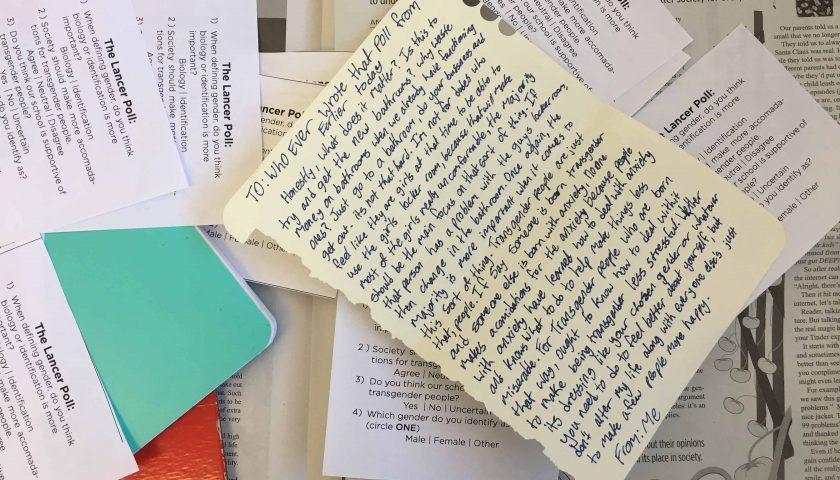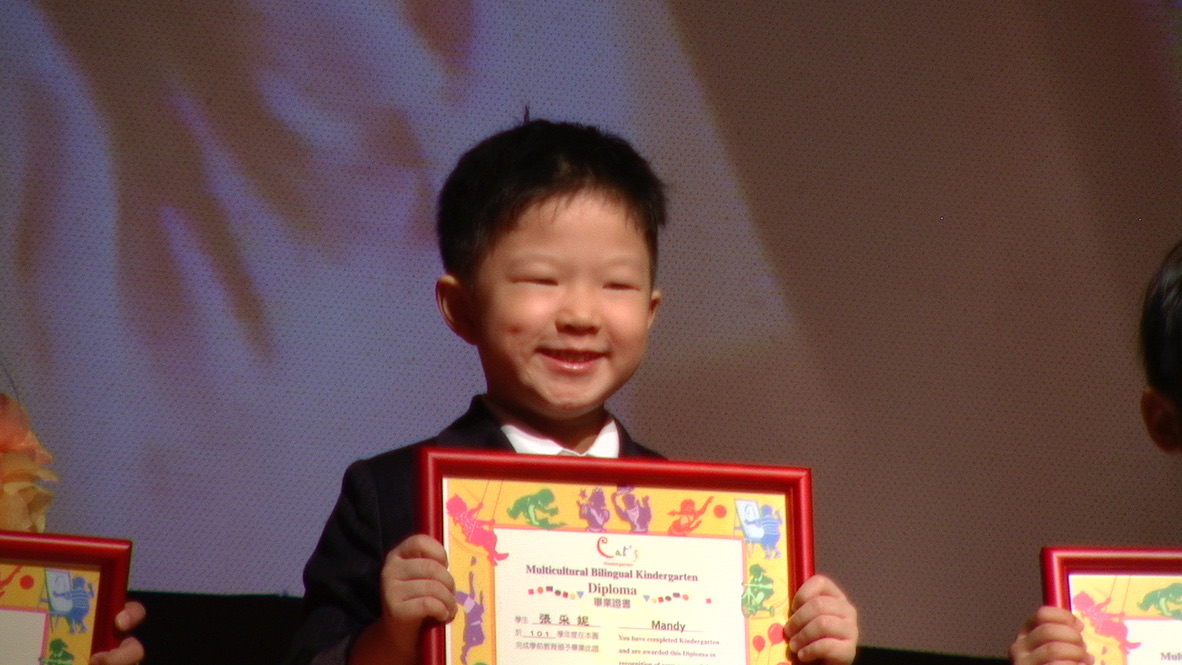In our most recent issue of The Lancer, we published an opinion article “You Say Tomato” (which you can find here) and a poll that discussed the place of gender labels in society. These are the poll questions
- When defining gender, do you think biology or identification is more important?
- Society should make more accommodations for transgender people. (Agree, Neutral, Disagree)
- Do you think our school is supportive of transgender people?
- Which gender do you identify as? (Male, female, other)
One student (who prefers to remain anonymous) sent us a letter sharing her thoughts on the issue. Her work follows.
TO: Whoever wrote that poll from earlier today
Honestly, what does it matter? Is this to try and get the new bathrooms? Why waste money on bathrooms when we already have functioning ones?Just go to the bathroom, do your business and get out. Its not that hard. I’m not for dudes who feel like they are girls at that time to be able to use the girls locker room, because that will make most of the girls really uncomfortable, the majority should be the main focus for that sort of thing. If that person has a problem with the guys lockeroom, then change in the bathroom. Once again, the majority is more important when it comes to this sort of thing. Transgender people are just that, people. Once again, the majority is more important when it comes to this sort of thing. I d say someone is born transgender and someone else is born with anxiety, no one makes accommodations for the anxiety because people with anxiety have learned how to deal with anxiety and knows what to do to help make things less miserable. For transgender people who are born that way, ought to know how to deal with it to make being transgender less stressful. Whether its dressing like your chosen gender or whatever you need to do to feel better about yourself, but don’t alter my life along with everyone else’s just to make a few people more happy.
From: Me [sic]
Another student, Peter Elia, wrote this response to both the poll and the article “You Say Tomato.”
To the editors of The Lancer on your recent article, “You Say Tomato:”
The tomato means nothing.
Around a month ago, I was reading a special issue of the National Geographic on gender issues. Amon other things, it contained an article and photo series depicting male rites-of-passage in a variety of places all around the world, from Lousiana to Kenya. This stuck out to me. I realized I had never had that experience, no coming of age or defining action.
I turn 18 years old in less than a month, but I do not feel like an adult. It isn’t that I am nervous, uncertain, or excited for the future — I don’t feel anything at all. It seems an arbitrary distinction.
The odd bit, though, is that I will be a “man.” That term feels incorrect when I say it in front of the mirror, when I look at my beard, when I see my own eyes and head and face and feel estrangement from that person within my mind. Capital M Man is better — I am of Mankind, am human, will live, suffer, love, die.
I have never felt like a “man,” never thought of myself that way. Male, yes, in every biological way — I have the right parts and the right genes and my brain is wired (roughly) in just that fasioh. And socially; I engage in the alpha postruing, in competitiveness, jealousy, and lust for the female form. I even engage in “manly” pastimes: I play sports, I’m a fan of firearms, video games, camping and barbecue. Heck, now I’m an Eagle Scout. But even that achievement felt hollow. Not that I am not glad to be an Eagle — I try to live those virtues and those ideals. Even so, I cannot sense my soul in the words.
But I also do feminine things (as regarded by some of my peers). I am capable of saying something si adorable, I have the capacity to cry. For some reason, whenever I play video games where you can make your own character, I almost always play as a woman — even in something like “Dark Soul” where the player’s backstory doesn’t matter and the character spends most of the game in unflattering plate armor and helm, I create a woman. I write poetry. I play the violin, I sing — spheres that were, ironically, once dominated by men, but now carry the effeminate connotation.
And when I hear someone talking disparagingly about white men, I experience a disconnect — part of me feels accused, another is indifferent. Though the accused part becomes inflamed when I think of how I’ve been stopped at airports because of my last name or my bears, or when someone points the finger at me directly, and tacks on that “straight” modifier to the front, as if they knew my instinct. Then the Taoist sage returns, urges calm, deliberate inaction, and realization that I never should have cared about my instinct, my skin, my look, my name anyways.
And when I am around different people, my words are different. I change to fit the group, I become mindless, lost in jokes or lust, until I wake up for a lucid second from the dream and walk into the desert.
So when it came time to answer your survey, I hesitated.
“What gender do you identify as?”
First I circled “male.” Then I went back and hit that snag on “identity.” I circled “other” for a second, then crossed that out and re-circled “male,” but I found myself wanting to write “nothing” off to the side. Uncertain.
I live in that seeking uncertainty, hunting. I spend much of my time contemplating the world, meditating, examining the reality we live in, its illusions and truths. In my limited treading, thought, experience, suffering, in my idiocy, I can say one key thing on the present topic.
A gender identity is a facade. It is a label. I used to think it was silly when people said to ignore the labels placed on you. Everyone needs labels to describe themselves, so others can understand them and who they are.
But labels obscure. They hide us. We wrap ourselves in our safety blankets, clothe ourselves in names and groups and material, fleeting trends. If I try to define myself as a man, woman, or something on that scale, I fall short. No words can fully encompass our humanity, least of all these old rags that we won’t let go of in sentimentality — or worse, we pretend that exchanging the scraps, dyeing them differently, selling them under a different brand; that this will change US, will alter the current of our souls.
Instead, it is distracting. We move away from the path of discovery, exploration, get lost in the debate instead of the desert, piece together meaningless arguments that do not change what is real and unreal. The label does not help others understand — it keeps us from wisdom, legs mired in the tarpit of culture.
I AM THAT I AM.
— Peter Elia






